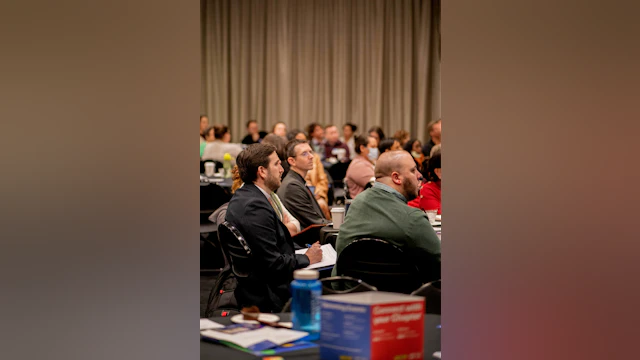My journey with The American Foundation for Suicide Prevention (AFSP) began while I was a student at the Seminary of the Southwest in Austin, Texas. My best friend invited me to attend an Out of the Darkness Community Walk, which she had previously participated in to honor a loved one who died by suicide. Always one to support my friends, I made a small donation and signed up. Little did I know that shortly after signing up for the Walk, my uncle Lester would die by suicide, and my family would struggle with the pain of that loss.
Becoming an advocate for suicide prevention has not only helped me to honor the life of my uncle, but it has also introduced me to an incredible community of people who have similarly been affected by suicide. Like me, they are transforming their pain into ways of loving and serving others through suicide prevention.
Today I am a priest in the Episcopal Church. As a queer Christian, I see how much pain and suffering my queer siblings face, and the statistics around suicide in the LGBTQ community are heartbreaking. According to research, LGB youth are about three times as likely to consider suicide, and about five times as likely to attempt suicide, in comparison to heterosexual youth. In addition, about 40% of transgender people have attempted suicide, which is nine times higher than general rate of the U.S. population. Through organizations such as AFSP and The Trevor Project, a non-profit that offers suicide prevention and crisis intervention services for LGBTQ youth, I have learned so much about suicide prevention in the LGBTQ community. Through these organizations, I also have gained incredible hope. There are so many people all around the country working to end suicide, and doing it in ways that honor the dignity of every human being.
On March 7, 2023, I was jittery with nerves and excitement as I prepared to present at the Stronger Communities: LGBTQ Suicide Prevention conference sponsored by AFSP's Maryland and Delaware chapters. The Stronger Communities conference series, arranged by local AFSP chapters, are designed to raise awareness about LGBTQ suicide risk, research findings, and strategies for LGBTQ suicide prevention in local communities.
The energy in the conference center was electric! Over 200 people, many of whom were social workers, clinicians, and therapists, gathered to honor the lives of LGBTQ people and learn the best ways we can work together to end suicide. It was a powerful show of the love and support that exists for people in crisis.
Before the event, I reached out to our local AFSP Area Director to ask her if she thought a presentation on Queer Theology and Suicide Prevention might be helpful. As a student of feminist and queer biblical studies, I have often felt that religion, which has historically done much harm to the queer community, has ways of amplifying queer experiences in ways that celebrate the uniqueness and holiness of LGBTQ persons. The Area Director encouraged me to submit a proposal, and I was thrilled to be accepted.
Given that my breakout session was a niche topic and scheduled at the end of a full day of incredible presenters, I was nervous that the session might not be well attended. I was wrong. In a full room of folks from different religious backgrounds, I shared my Christian perspective on how queer experiences teach us more about God and lead us to a more loving world where every life is valued and has meaning.
The Bible has sometimes been used as a tool to attack LGBTQ people. But in my breakout session, we looked at how the experiences of trans and non-binary people help us to understand the creation story. Yes, God made day and night, dry land and sea, and men and women –– but God also made the beauty of dawn and dusk, which are neither day nor night; God made the beauty of wetlands and swamps, which are neither dry land nor sea; and God made the beauty of trans and non-binary folks, who go beyond the binary of man and woman. Through the lens of queer experiences, we magnify the beauty of creation and the glory of God. Not only should LGBTQ people be accepted by the church, but it should be understood that their presence makes the church better and deepens our understanding of God.
Not only did I have many people in attendance, but I was humbled by the many participants who felt comfortable sharing their own stories of suicide and mental health as it relates to religion. We laughed, tears were shed, and the room felt like a place where hope pervaded.
I left the conference with a bag full of business cards, information sheets, and some fun swag. More importantly than all of that, I left with a reminder that the forces of hope and love are far more powerful and numerous than the forces of despair and division that exist in our country. Yes, LGBTQ folks face discrimination that can exacerbate the many other risk factors that contribute to suicide. However, there are intelligent, loving people working to end that discrimination.
In my office and in my home, I have many AFSP postcards, magnets, stickers, and water bottles with the word "HOPE" on them. It’s a simple word that conveys possibilities for a more loving world. The Stronger Communities Conference left me with so much hope. When we come together in love to share our stories and share what research teaches us, I am convinced that we can stop suicide.
Learn more about AFSP’s Stronger Communities conferences here.
